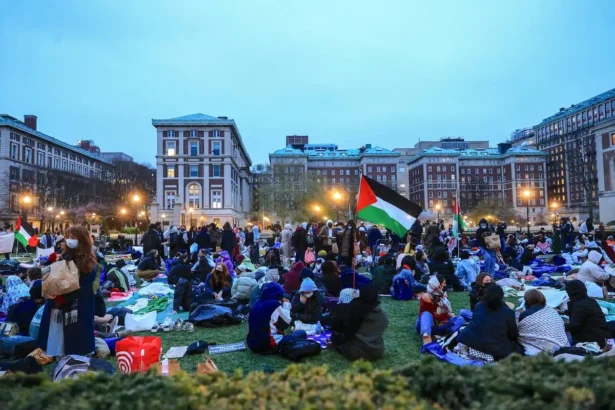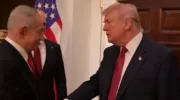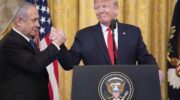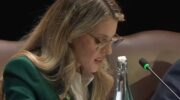The message is clear: if you are a foreign student in America and you dare to speak up for Palestinian rights, you risk being branded a terrorist and expelled from the country. Let us remember: the right to dissent is foundational to any democracy
By Adam Warden, Reposted from Middle East Monitor, March 28, 2025
Just before breaking her fast during Ramadan, Rumeysa Ozturk—a Turkish PhD student at Tufts University—was forcibly taken by masked federal agents as she left her Somerville home to meet friends. There were no warnings, no charges and no explanation. Within hours, she had vanished into a system that has become synonymous with secrecy and abuse. Her student visa was abruptly revoked, and despite a federal judge’s order to keep her in Massachusetts, she was transferred to a remote ICE facility in Louisiana.
The Department of Homeland Security alleges she had ties to Hamas — a claim for which no public evidence has been presented. Her legal representation was blindsided. Tufts University was left scrambling. The public was deliberately kept in the dark. And yet, officials insist that this was a matter of national security, not a violation of civil liberties. It is not. This is state power weaponised against dissent. It is unconstitutional political repression wrapped in the language of security – a tactic meant to intimidate, silence, and vanish those who challenge the status quo of the current administration.
Video circulating on social media show the detention of Turkish student, Rumeysa Ozturk, by masked plainclothes US officials who refuse to identify themselves. Rumeysa, a doctoral student at Tufts University in Boston, was detained on Tuesday by the federal immigration agents… pic.twitter.com/DGXMipjiJk
— Middle East Monitor (@MiddleEastMnt) March 27, 2025
Ozturk’s story is not an anomaly. It is the latest in a disturbing pattern of the US government targeting Arab and Muslim students, international scholars and pro-Palestinian activists using the blunt tools of immigration law. The legal framework that enabled her disappearance — much of it rooted in the USA PATRIOT Act and its post-9/11 successors (NDAA 2012, Homeland Security Act 2008, FISA Amendments Act 2008) — gives the executive branch extraordinary powers to surveil, detain, and deport based on the flimsiest of pretexts. Compounding this erosion of civil liberties, recent statements from House Speaker Mike Johnson reveal a troubling willingness to undermine judicial independence. Johnson asserted: “We do have the authority over the federal courts, as you know. We can eliminate an entire district court.” Such rhetoric not only threatens the separation of powers but also signals an alarming readiness to dismantle checks and balances that safeguard individual rights – citizens and noncitizens alike.
This includes the authority to revoke visas without judicial oversight, to conduct warrantless surveillance on individuals merely suspected of foreign ties, and to detain people — sometimes indefinitely — based on vague or secret evidence. The 2012 NDAA’s Section 1021, for instance, allows for the military detention of anyone deemed to be “substantially supporting” terrorist organisations, a term so broad it can encompass peaceful protest or social media posts. The FISA Amendments Act further eroded privacy protections by permitting the NSA to spy on Americans’ international communications without a warrant.
Together, these laws have created a parallel legal system — one in which the usual rules of due process and constitutional rights are suspended. In this shadow system, people like Rumeysa Ozturk are not individuals with rights; they are “threats” to be neutralised. Evidence is optional. Legal representation is secondary. The presumption of innocence is nonexistent. The government need only whisper “national security” and the machinery moves into action.
[Editor’s note: Why this is happening: The Zionist Destruction of American Higher Education.]
The Trump administration weaponised this machinery with ruthless efficiency. Now, under its second term, it is doubling down.
Secretary of State Marco Rubio recently bragged about revoking over 300 student visas from what he called ‘campus agitators’, adding, ‘Every time I find one of these lunatics, I take away their visa.’
That is not the language of a public servant. That is the language of a strongman. When Rubio says students were never given visas “to tear up our campuses,” he reveals the truth: this administration does not believe in democracy — it believes in control. What Rubio and the Trump administration are defending is not national security. It is a variant of political cleansing — an attempt to erase from the public square any student, scholar, or voice that refuses to pledge allegiance to the narrative of the state and its obsequious loyalty to Israel.
Ozturk’s detention is not an isolated incident — it is a manifestation of a growing authoritarian impulse to crush dissent, even when that dissent targets the barbarity of a foreign entity’s policies, such as those implemented by Israel. In the aftermath of the Israeli assault on Gaza and the global outrage it provoked, college campuses have become flashpoints of resistance. Students are mobilising, building coalitions, and demanding accountability from institutions complicit in war crimes. The state’s response has not been dialogue or debate — it has been surveillance, intimidation, and in Ozturk’s case, disappearance.
In response, the state legislature has introduced anti-BDS laws. Donors have threatened universities. Pro-Israel lobby groups have created blacklists of professors and students. And now, apparently, the federal government has begun making people disappear in broad daylight.
The message is clear: if you are a foreign student in America and you dare to speak up for Palestinian rights, you risk being branded a terrorist and expelled from the country.
This is not just about Rumeysa Ozturk. This is about what kind of country the United States is becoming — and who gets to have a voice in it.
Academic institutions should be sanctuaries of thought, not sites of fear. Tufts University has issued statements of support and expressed concern about the lack of transparency in Ozturk’s detention, but concern is not nearly enough. University President Anthony P. Monaco and Provost Nadine Aubry must go beyond vague expressions of solidarity. They must publicly and unequivocally condemn what happened, demand her release, and commit institutional resources to defending students from political intimidation. And if their words are to mean anything, they must take concrete action — beginning with divestment from companies and institutions complicit in Israel’s occupation and apartheid. Continuing to profit from this violence while offering hollow reassurances of support is hypocrisy of the highest order. Their silence is not neutrality — it is complicity.
The Biden administration, too, bears responsibility. Though this latest action occurred under Trump’s renewed tenure, it is the Democrats’ timidity on Palestine and civil liberties that laid the groundwork. Too often, political leaders on both sides of the aisle have conflated criticism of Israel with anti-Semitism, and peaceful protest with incitement.
Let us remember: the right to dissent is foundational to any democracy. To strip someone of their liberty because they oppose a foreign government’s actions is not just undemocratic; it is tyrannical.
This case demands action. Members of Congress must demand an immediate investigation into the circumstances of Ozturk’s detention. Legal organisations must challenge the constitutionality of the immigration powers being wielded against political activists. Civil society groups must raise their voices to ensure that she is not forgotten.
This moment also demands reflection from the American public. Are we comfortable living in a nation where unproven allegations are enough to destroy a life? Where can your country of origin, your religion, or your political beliefs render you disposable in the eyes of the state? The fight for justice is not only about policies — it is about what kind of people we choose to be in the face of injustice.
And writers, journalists, federal employees, and everyday citizens must resist the temptation to look away.
Rumeysa Ozturk was taken in silence. Let her not be forgotten in silence.
To disappear someone is an act of terror. To speak their name is an act of resistance.
Adam Warden is a Muslim-American student and researcher at the University of Massachusetts Lowell.
RELATED:
- The Last Time Pro-Palestinian Activists Faced Deportation
- The Case Against Mahmoud Khalil: How The Israel Lobby Fueled a Campus Crackdown
- Campus Police Are Using Israeli Spy Tech to Crack Down on Student Protest
- Columbia network pushing to deport and arrest student protesters
- The Israel-Affiliated Organization Leading the Backlash Against Student Protests
- Debunking three myths about pro-Palestine student protests in the US





